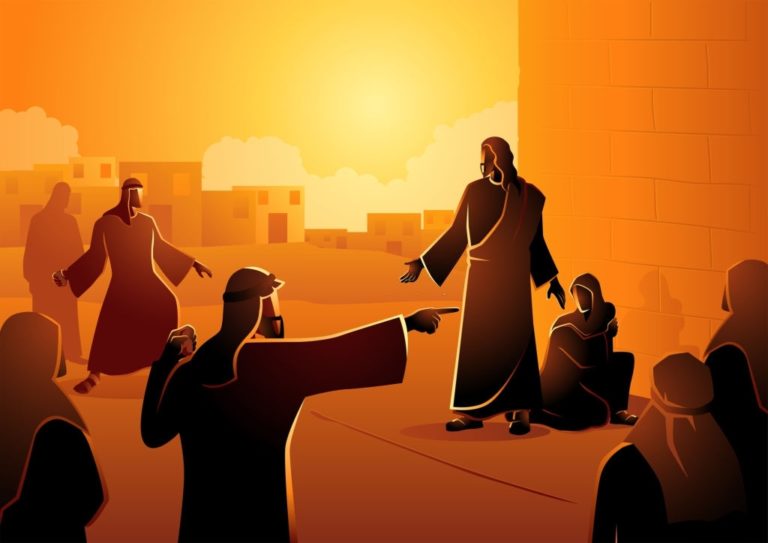Who Do You Say I Am? – Part 1
Most of us know the greatest stories ever told. Like Noah and the ark, which ends with the beautiful promise of the rainbow. Then we have Moses, who parted the Red Sea as the Israelites escaped Egypt. We know of baby Jesus lying in the manger with shepherds and wise men paying honour to the newborn King. The story of the empty tomb on Sunday morning never gets old. Then we have the five loaves and fishes from a lunch that required an act of obedience from a little boy. We also remember the story of a Faithful Shepherd who leaves the ninety-nine and goes after the lost one.
Often, we focus on the action, characters, or outcome in stories. But each book in the Bible has another purpose–to turn our focus back to the Author of life. To fix our minds on Jesus.
When you read Matthew 16, a question emerges from verses 13 and 14 that you can’t ignore. “Who do people say the son of man is?”.
Let me paint a picture for you. At this particular point of the story, Jesus leads his disciples away from what they had been doing, which was ministry in a very Jewish region. Jesus then leads them out for discipleship training. He was intentional about where he went as he travelled with the disciples to a particular place in the region of Caesarea Philippi. It was full of worship of false gods. A city far away from a Jewish majority, this city was known as a hard-core Pagan territory, and in that place, Jesus would reveal who he was. He purposely initiates the conversation in Matthew 16 with them.
Mathew 16:13, NIV When Jesus came to the region of Caesarea Philippi, he asked his disciples, “Who do people say the Son of Man is?” In other words, He was asking what people in this particular culture and society believed about him. It wasn’t by accident that Jesus asked this question in this location. In verse 14. They replied, “Some say John the Baptist; others, Elijah; still others, Jeremiah or one of the prophets.”
The three men mentioned in this response are known for doing mighty things. They were not individuals who did nothing in the Bible. The disciples gave a favourable answer, a positive answer.
I have come to understand there is a massive difference between God being personal and your personal opinion of God. Jesus is personal, but he’s also exclusive about who he is; what I mean by this is that he is clear about who he is. He will not let us define him by our opinion, he knows who he is, and we must be defined by him.
Genesis 1:27, NIV So God created mankind in his own image, in the image of God he created them; male and female, he created them.
At this point, Jesus now asks the disciples a more pressing/essential question. This is more specific. This question matters more than the first. Let’s take a look at verse 15 of Matthew 16. “But what about you?” he asked. “Who do you say I am?”.
And this is one of the most important questions you will ever ask yourself because it will impact every other aspect of your life and how you live. Regardless of whether you have a positive perspective or a favourable opinion about Jesus, your opinion doesn’t count if it is not absolute truth. Jesus knows that there are shallow opinions of who he is. A lot of these opinions are based on ignorance and indifference. So Jesus cuts straight to the point and turns his attention to his followers in our main text.
Jesus essentially says, “it doesn’t matter what the world thinks of me; if you are going to be my disciples, my followers, you have got to know who I am”. Peter stands up and replies in verse 16 “you are the Messiah, the son of the living God”. In Peter’s short response, he was saying there is a creator. He acknowledged that our world is imperfect, and we need a Saviour. The problems of the world cannot be fixed by those in the world. In referring to Jesus as “Son of the living God”, Peter acknowledged that God is alive. He is not dead. He is not absent. He is not asleep or disengaged.
If we believe God is distant, we’ll take matters into our own hands. If we believe God is angry, we’ll walk on eggshells, avoid Him, or lie. If we believe God is uncaring or too busy for us, we’ll struggle with finding purpose in life. But if we believe God forgives, we’ll approach His throne of grace with confidence, thankfulness, and relief. If we believe God heals, we’ll stop covering our wounds and allow His healing hand to touch us. If we believe He’s the giver of new life, we’ll unlock the dark places of our past and allow His light to dissolve the shadows. God desires that each one of us would genuinely know him.
Today is an opportunity to examine your own heart. Jesus is not asking us to parrot back the answers we’ve heard or quote the best Christian quotes because it sounds good and might be favourable as we see in his disciples first response to who they believe he is. Maybe that’s why he pushes the disciples to move from what they hear – John the Baptist, Elijah, Jeremiah, or one of the prophets — to what they know to be true “But who do you say that I am?”. This is a challenging question. I wonder if we sometimes too readily accept and settle for answers we hear from others. We tell ourselves that if I hear it in church, it must be true, or if the Instagram thread sounds impressive, it must be true.
So the challenge is this!
– Who do you say Jesus is when your current reality has you questioning everything?
-Who do you say Jesus is when things come up that you thought long ago you dealt with?
-Who do we say Jesus is when you realise home life hasn’thasn’t been the greatest?
-Who do you say Jesus is when people have let you down?
-Who do we say Jesus is when faced with decisions that have no easy answers?
-Who do you say Jesus is when taking a stand against a louder and seemingly more powerful majority?
-Who do we say Jesus is when a doctor gives news we did not want to hear, or our life seems to be falling apart?
-Who do you say Jesus is when the answer to your prayer is a no?
-Who do you say Jesus is when life is going incredibly well, and you’re slipping back into leaning on your understanding and walking in natural strength?
How you live out these questions affects every area of your life.
So who do we say Jesus is when faced with decisions without easy outcomes? Next week, we will look at a good example in part 2 of this topic.







Amazing
Glad you were blessed!